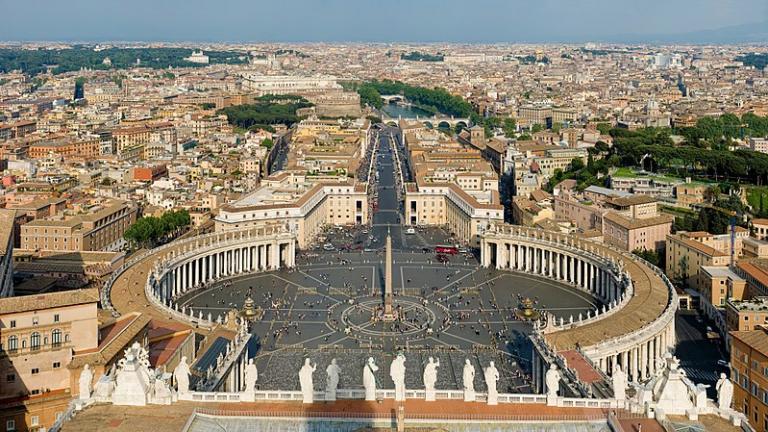One topic that has come up repeatedly in conversation with friends and family, over the past year, is: what happened to everyone?
The failure of judgment and morals on the part of many people we used to respect has been sobering. It was bad enough when it was just the Trump phenomenon we had to grapple with—when we were puzzling over how intellectuals who love art and beauty could prop up a movement so fundamentally vulgar and disordered, how neighbors who seemed friendly and charitable could enthusiastically support a figurehead representing the worst offenses against charity, how farmers claiming to love the earth could promote an anti-ecological ideology of domination and greed.
Then COVID came.
If everyone had been responsible and truly been in it together, it would not have been so bad. The privileged could have made sacrifices on behalf of the vulnerable. Those in leadership could have used their influence to promote the common good. But that didn’t pan out.
Instead, conspiracy theories sprang up, and were circulated hysterically…by people who claim to have a special line to God’s own truth. Anti-maskers, motivated by a “you don’t tell me what to do” mentality, have brazenly flouted public health restrictions, putting our seniors and our disabled at risk, and putting greater pressures on those of us trying to do the right thing. And these anti-maskers are the people who consider themselves pro-life.
Yet when we presume to call them on their selfishness and lack of charity, suddenly we are the judgmental ones.
We look around and see that the people we thought we could trust have become deluded mongers of bizarre conspiracy theories, afraid of all the wrong things, seeing demons lurking behind doors but never seeing the evil that is present before them–the evil they themselves prop up.
Why, I asked recently, are Christians being so awful? What is wrong with our faith tradition that it seems to produce people with the worst possible patterns of behavior and the feeblest grasp of truth?
Most of the academics who most influenced me when I was a youthful intellectual in search of truth, beauty, and goodness now bring to mind this line from the Inferno: “here dwell those who have lost the good of the intellect.” Were we even reading the same books? Considering the same ideas? Where did they go wrong—or, perhaps, were they always wrong, and I simply learned to see things differently?
Why do Christians believe conspiracy theories instead of the truth?
A piece by Joe Forrest from last year explores this question. Forrest lists three reasons why conspiracy theories appeal to us: they make us feel special, they help us make sense of a chaotic world, and they make reality feel more exciting. Reading these, I agreed entirely. I also thought: okay, but Christians ought to be the least likely people to need these fixes. We already know we are special, have access to narratives to help us understand reality, and know we are part of an exciting story. So why are Christians especially prone to falling to this? Forrest wonders this, too. He notes that far right conspiracy theory groups tend to pander to Christians, and that Christians have been taught, too often, to fear the establishment as a tool of oppression.
I think that’s part of it. But it seems that the extent to which Christians are giving themselves wholeheartedly over to alternative realities which are not harmless. I feel that there is something deeply wrong with the entire way we are practicing religion, and being formed by it.
What’s amiss in our education?
I’ve thought a lot about failures in the classical liberal arts education that I used to consider a valuable inoculant against superstition and narrow-mindedness. One idea I return to repeatedly is that when there’s too much emphasis on system over phenomenological thinking—when one defines things according to their place in a pre-existing set of ideas, rather than engaging with beings and Being—it’s easy to go wildly wrong.
As an undergraduate I appreciated Kierkegaard’s amusing take-down of Hegel’s obsession with system because it raised important criticisms relevant to the failures in thinking on the part of the embryo Thomists with whom I regularly argued. Note that I say Thomists, not Thomas. Aquinas, like any good philosopher, would never confine himself to working within the confines of any one system, instead of engaging with Being and beings. Yet this is what a lot of the students I knew were doing, and it meant that they regularly had access to a lot of wordy definitions that served as a veil over actual truth, not a window to it.
I was fortunate, as a freshman, to encounter the ethical tradition of Christian personalism. And I and am happy to say that the philosopher who first introduced me to that tradition is still someone I honor and respect. One of very few, from those years. This doesn’t mean I think that phenomenological personalism is a cure-all. But it prepares one to resist a number of common errors in thinking, because it insists that one look face to face at what is given. This requires a work of openness and a cultivation of what Cardinal Newman explored as the illative sense: the ability to take in multiple impressions, none of them on their own solid evidence, but together forming a consistent picture on the basis of which one can act with practical if not theoretical certainty.
Another idea I’ve returned to is, of course, the extent to which some of our formative texts in the western tradition advance varieties of bigotry, and the failure of though leaders adequately to address this. I wrote recently about the problem of antisemitism in the Catholic literary canon. It’s only one of many such problems.
The danger of authoritarian religion.
What seems most crucial to me, when I mull over what went wrong, is something simpler than fields of philosophy or how college students practice ethics. It’s how we approach our faith in the first place. It’s that we’ve made our religion a totalitarianism.
When we are taught that we may not question, this prepares us for acquiescence to authority, any authority, blindly and unreasoningly. When obedience to the precepts of faith is mandated on pain of mortal sin—which, of course, means damnation—what kind of free choice of the will can people ever develop?
You end up with a populace primed to believe what they are told without evidence, and to go blindly where those around them are going, especially if those around them check the boxes they are taught to check. For all the talk about moral fortitude, those brought up with authoritarian religion never gained the strength to stand up on their own, to think on their own, to go against the prevailing current. They need to move in mobs. While they may claim to be standing up against the current of “the world” in reality, they are sealed within safe bubbles, mirroring those around them. It is not a profoundly human way of living. It is not a way of living that predisposes people toward critical thinking or moral action.
As an added detriment, we are constantly told we must look to invisible realities as realer than what’s before our eyes, so even if the institutional church is a cesspool of corruption and abuse we are assured that this is not the real, true, eternal church. And thus efforts for reform are neutralized. Similarly, we are told that the sufferings of this life are ephemeral and to be born gladly, for the sake of a transcendent happiness. NFP a torment to your marriage? Well, talk about your suffering as beautiful! Poverty rampant? Well, the poor will always be with us, and Jesus’s Kingdom is not of this earth, so don’t get to worked up about trying to fix things. Your leaders are being cruel and unjust? Remember, we are all sinners, and you can’t fix this world, you can only fix yourself!
A sacramental imagination should engage us with what is real and present. It should not distract us from this earth, pointing to infinitely-deferred imaginary beauties and consolations. Yet with our fixation on the sacraments as controlled by clergy, we miss out on understanding that creation itself is sacramental. Jesus said “what you do to the least of these, you do unto me.” So why have we forgotten that we can find Jesus in this way? Why do we clamor to open churches, as though this is our only gateway to meeting the divine? As though we have to trample the poor and neglect the sick, to get our own little piece of God?
This is not a problem exclusive to Catholicism or even Christianity. Any religion with a hierarchical structure can tend in this way.
When one’s assent is not to what is given in reality, but rather to what one is commanded to believe, one loses the ability to see. Thus our good and faithful Catholics do not think about trying to grasp who someone like Trump really is. They have been told that the evidence of their eyes is irrelevant, their senses not to be trusted. So they simply believe what others tell them he must be. They believe the pandemic is fake, because they heard someone else say so.
They also enthusiastically believe, with zero evidence, that Hilary Clinton is involved in sex-trafficking at a pizza joint, that mass shootings never happened, and that a shadowy global organization (read: Jewish organization) is participating in ritual cannibalism. Who needs evidence, when one has spent one’s life being taught to ignore evidence and simply believe?
Of course, ironically, these same people will claim that they are the freethinkers, the rest of us sheep. I wonder if their need to stand up against an imaginary oppressor, in the form of public health experts who simply want to contain the spread of the virus, is some frustrated outburst of adolescent energy from those who were never permitted to think for themselves? If constantly toeing the line with authoritarian religion leaves them feeling like they need to shake a fist at someone, even if it’s a long-suffering epidemiologist?
The church has emphasized authority and obedience in a way that strikes me as contrary to the gospel Jesus taught. Jesus called, but rarely commanded. The commandments he gave were few, direct, simple, and radical. And what he offered was not bondage, but liberation. The problem with a liberated people is that they terrify those who need to control others in order to maintain their sense of purpose or identity. Perhaps this is why the liberated early church so quickly began to coalesce into hierarchical groups? And why Christian leaders have so often allied with oppressive regimes?
Our leaders have done infamy in order to keep their grip upon material history. And now perhaps it may be slipping away. With the way Christians are behaving right now, and the understandable backlash against them, church leaders’ obsession with control might end up their own undoing. And maybe that’s a good thing.
image credit: st-peters-square-wikipedia.jpg
















